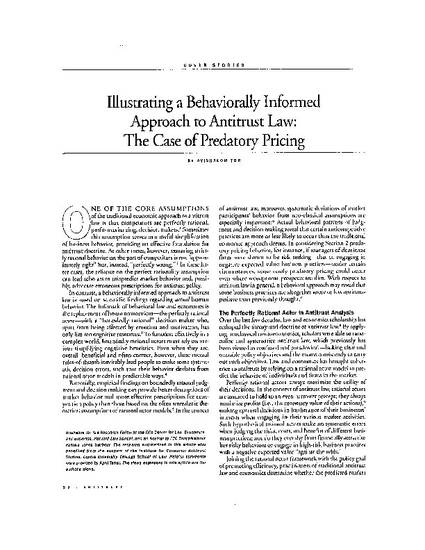
One of the core assumptions of the traditional economic approach to antitrust law is that competitors are perfectly rational, profit-maximizing, decision makers. Sometimes, this assumption serves as a useful simplification of business behavior, providing an effective foundation for antitrust doctrine. At other times, however, assuming strictly rational behavior on the part of competitors is not “approximately right” but, instead, “perfectly wrong.” In these latter cases, the reliance on the perfect rationality assumption can lead scholars to mispredict market behavior and, possibly, advocate erroneous prescriptions for antitrust policy. In contrast, a behaviorally informed approach to antitrust law is based on scientific findings regarding actual human behavior. The hallmark of behavioral law and economics is the replacement of homo economicus – the perfectly rational actor – with a “boundedly rational” decision maker who, apart from being affected by emotion and motivation, has only limited cognitive resources. To function effectively in a complex world, boundedly rational actors must rely on various simplifying cognitive heuristics. Even when they are, overall, beneficial and often correct, however, these mental rules-of-thumb inevitably lead people to make some systematic decision errors, such that their behavior deviates from rational actor models in predictable ways.
Potentially, empirical findings on boundedly rational judgment and decision making can provide better descriptions of market behavior and more effective prescriptions for competition policy than those based on the often unrealistic theoretical assumptions of rational actor models. In the context of antitrust law, moreover, systematic deviations of market participants’ behavior from neo-classical assumptions are especially important: Actual behavioral patterns of judgment and decision making reveal that certain anticompetitive practices are more or less likely to occur than the traditional economic approach deems. In considering Section 2 predatory pricing behavior, for instance, if managers of dominant firms were shown to be risk seeking – that is, engaging in negative expected value business practices – under certain circumstances, some costly predatory pricing could occur even where recoupment prospects are dim. With respect to antitrust law in general, a behavioral approach may even reveal that some business practices are altogether more or less anticompetitive than previously thought.
Available at: http://works.bepress.com/avishalom_tor/8/

Reprinted with permission of Antitrust.
Avishalom Tor joined the faculty at Notre Dame Law School in 2011.